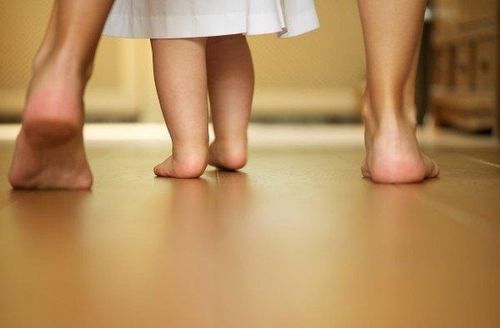This is an automatically translated article.
Sleep is very important for the development of young children. Sleep deprivation can be caused by fussiness or going to bed late. The question often asked is whether children who sleep late are dwarfed or have developmental delays like? The following article will discuss the effects of late sleep on children's growth.
1. How much sleep is enough for children?
Many parents often worry about whether their children sleep late or not. In fact, the amount of time children get enough sleep varies by age. Specifically:
Children 1 week to 4 weeks old need to sleep 15-18 hours a day, each sleep is usually 2-4 hours and does not follow a day-night cycle. Babies 1 month to 4 months old need 14-15 hours of sleep a day, 4-6 hours of sleep each and sleep more in the evening. Children 4 months to 1 year old need 14-15 hours of sleep a day, which can help them develop healthy sleep habits. The amount of sleep as well as the time sleeping during the day will gradually decrease and the time sleeping at night will be longer. Children 1 to 3 years old need 12-14 hours of sleep each day, including a nap in the afternoon and a long nap of about 10-13 hours in the evening. Children 3 to 6 years old need about 10-12 hours of sleep each day. Most children in this age group have formed a sleeping habit. Children 6 to 12 years old need 9-12 hours of sleep each day. Children over 12 years old need 7-11 hours of sleep every day. This is the period when children are most susceptible to lack of sleep due to the pressure of studying as well as physiological changes. This will lead to growth retardation. Getting enough sleep will help children focus better, be more alert and provide more energy for physical and other activities.

Trẻ 6 tuổi đến 12 tuổi cần ngủ 9 – 12 giờ mỗi ngày
2. Lack of sleep slows down children's development
A sleepless night will not stunt your child. But in the long run, a child's development can be affected by not getting enough sleep. The harmful effects of sleeping late on children's development include:
Impaired immunity. Prolonged sleep deprivation can disrupt a child's immune system, reducing its ability to fight off pathogens. Therefore, children are prone to colds, flu, fever, cough. Slow physical development. Since growth hormone is normally secreted during sleep, if a child regularly sleeps too little due to late sleep or lack of sleep, growth hormone will be inhibited. Lack of sleep can also affect other hormone levels. Declining mental health. Children who are irritable, moody, and long-term can cause mental disorders such as depression and anxiety. Studies show that children who sleep late are more likely to become obese. The cause is thought to be due to a decrease in leptin levels (the substance that makes children feel full) and increased levels of ghrelin (the hormone that stimulates hunger) in sleep-deprived children. To summarize, sometimes a sleepless night or a late night of sleep makes a child feel tired and cranky the next day, but will not harm their health. However, if sleeping late or lack of sleep is prolonged, it will increasingly seriously affect children's mental, ability to concentrate as well as growth. Late sleep is the leading cause of growth retardation in children. Therefore, if children have sleep problems, parents can take them to medical centers for examination and treatment.
Please dial HOTLINE for more information or register for an appointment HERE. Download MyVinmec app to make appointments faster and to manage your bookings easily.
References: kidshealth.org, nhs.uk













